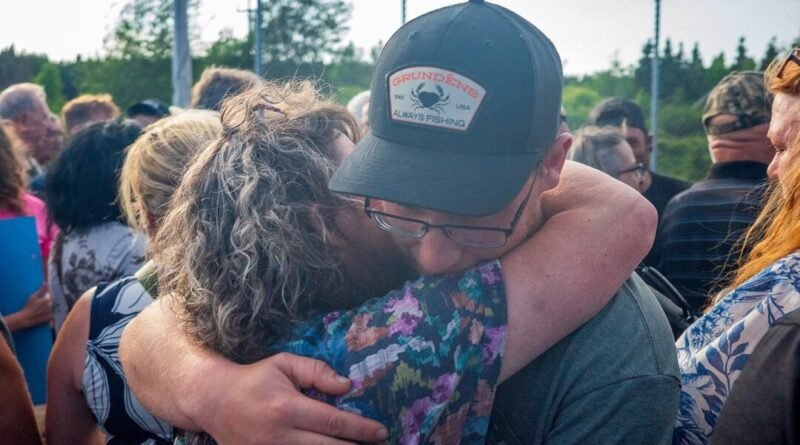After their harrowing ordeal, ‘Lucky 7’ fishers find joy in Newfoundland as they survive days lost at sea.
NEW-WES-VALLEY, N.L.—There was a powerful word being repeated in the joyful Newfoundland community of New-Wes-Valley on Sunday: “Miracle.”
Over and over, residents out walking or chatting to one another in local stores described the rescue of seven fishermen from the area who had somehow survived two days in a life-raft on the Atlantic ocean as nothing short of miraculous.
“Thank you, thank you, thank you. Thank you for returning our men,” Betty Lou Pollett told a crowd of hundreds at the end of a community parade held to celebrate the fishers’ return.
The Elite Navigator fishing boat and its crew seemed to vanish on Wednesday night after several days at sea fishing for turbot. The craft was reported missing on Thursday after transmitting its final signal at around 8:30 p.m. the night before, the Canadian Coast Guard said. The vessel had caught fire, forcing the crew to abandon the ship and wait for rescue on the life-raft.
In New-Wes-Valley, which is an amalgamation of three small fishing communities along Newfoundland’s northeast coast, people braced for the worst. Fishing is among Canada’s deadliest professions, and tragedy is a common thread linking coastal communities across Atlantic Canada.
But on Friday night, out on the ocean, searchers saw a light from a flare. It brought them to a life-raft, where the seven fishermen — who people are now calling the Lucky 7 — were waiting.
The men spent about 50 hours adrift in the raft about 220 kilometers away from land, said Eugene Carter, the crew’s captain. The fire broke out on Wednesday night in a locker on the main deck when they were just a couple of hours into a 25-hour journey home, he said.
“We tried to extinguish the fire once, and then it just shot right back at us,” Carter said in an interview. “It’s like wood burning. We heard the cracking. So we knew that it was pretty serious and that it was out of our control.”
He put out three distress calls, he said, but they weren’t answered. “The fire probably melted the devices, stuff like that, wouldn’t allow it.”
The crew passed the time in the life-raft telling jokes and passing their flashlight around as if it were a microphone to interview one another.
It was cold and foggy and wet, and the men were crammed into a boat roughly the size of a small car. Sleep was scant, coming only if they managed to nod off with their heads tipped onto their chests. Birds — “a lot of birds” — swooped and flitted around the raft, “driving us crazy,” Carter said.
As Friday wore on, a few of the fishermen seemed to be losing hope they’d ever be found. But Carter said he had a feeling. He had two flares left, and he knew he had to wait out the fog before he used either one. That night, when the sky finally cleared, he set off a smoke flare.
Nothing happened for a few hours, he said, but then a helicopter appeared and flew over the raft. Carter said he scrambled to light his hand-held flare in time to wave it at the helicopter.
“They didn’t see it, and that was my last flare,” he said. “But a coast guard ship was actually looking out, and seen it. And that’s what got us rescued, my last flare.”
Fisher Toby Peddle said he was terrified as he leapt from the burning boat onto the life-raft. He can’t swim, he said in an interview, and he didn’t have a survival suit on.
“It was either jump and risk drowning or stay and be burned,” he said. “There was no time to think about it. I just knew I had to jump.”
Carter and another crew member, Jordan Lee King, promised they’d grab him as soon as he hit the water, Peddle said, and they made good on their promise.
“Jordan had said, ‘Don’t worry, I’ll catch you before you even get in the water,’” recalled Peddle.
He credited Carter for keeping the crew calm as they drifted in the life-raft, surrounded by nothing but fog and an endless expanse of ocean.
“He just kept telling us, ‘We’re going to be fine. They know where we are, they’ll find us,’” he said. “He’s a hero.”
The hardest moments came when the men could hear helicopters flying overhead and knew the pilots couldn’t see them through the fog.
On Sunday, buildings around New-Wes-Valley were decorated with balloons and signs saying, “Welcome home, Lucky 7.” The town organized a massive vehicle parade, in which hundreds of cars drove from one end of the town to the other, decorated with streamers and giant gold balloons shaped like the number 7.
The parade ended at the local baseball field, where hundreds gathered to hug the fishermen. They all held 7-shaped balloons and then released them into the sky.
Newfoundland and Labrador Premier Andrew Furey gave them all an award for bravery. Mike Tiller, the mayor of New-Wes-Valley, announced the town would erect a living monument to the men and their incredible survival, and the crowd erupted.
The community had previously canceled its nine-day Crab Festival when the fishers were missing out of respect for their families. Now that the men are home, the festival is back on, with opening day on Monday.
Carter said he was still coming to grips with what happened. But he was ready to head back out to fish.
“I told all my crew members ‘Statistically, you could be driving to Gander every day and you’d have a better chance of getting in an accident in your vehicle than of this happening again,” he said. “Don’t give up on your fishing.”





